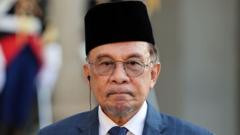Who is Anwar Ibrahim and How Did He Help Trump Achieve a Peace Deal?

Published: 2025-10-28 04:00:26 | Category: world
Malaysian Prime Minister Anwar Ibrahim has recently gained significant attention for his diplomatic efforts and political manoeuvring, notably securing a tariff reduction deal with US President Donald Trump, which brings Malaysian export tariffs down from 24% to 19%. This deal is not just a financial relief for Malaysia’s economy but also strengthens Anwar’s position as a leader who can bridge crucial international gaps, particularly amid rising domestic pressures. Anwar's political journey, marked by resilience and strategic alliances, has positioned him as a stabilising force in Malaysia's shifting political landscape.
Last updated: 04 October 2023 (BST)
What’s happening now
Currently, Prime Minister Anwar Ibrahim is navigating a complex political landscape, both domestically and internationally. His recent meeting with US President Trump at the ASEAN summit in Kuala Lumpur has drawn attention, particularly due to the tariff reduction agreement that aims to boost Malaysian exports. The backdrop of Anwar’s leadership is a country experiencing rising living costs and demands for economic reforms, which has led to protests and calls for his resignation. However, Anwar’s diplomatic engagements could help create a more stable economic environment amidst these challenges.
Key takeaways
- Anwar secured a tariff reduction from 24% to 19% on Malaysian exports to the US.
- His leadership has brought relative political stability to Malaysia, contrasting with the rapid changes seen in recent years.
- Domestic pressures include rising living costs and protests against his administration.
- Anwar faces challenges in balancing international diplomacy with domestic expectations, especially regarding the Palestinian cause.
- The upcoming elections in 2028 will be pivotal for Anwar’s political future.
Timeline: how we got here
Understanding Anwar Ibrahim's journey to the prime ministership involves key events over the last few decades:
- 1982: Anwar joins the United Malays National Organisation (UMNO).
- 1998: Anwar is sacked as deputy prime minister and jailed for sodomy and corruption.
- 2004: His conviction is overturned, marking his return to politics.
- 2018: Anwar's coalition wins the general election, leading to his eventual appointment as PM in 2022.
- 2023: Anwar negotiates a significant tariff reduction deal with the US amid growing domestic unrest.
What’s new vs what’s known
New today/this week
Prime Minister Anwar Ibrahim has brokered a tariff deal with the US, reducing export tariffs on Malaysian goods. This agreement aims to enhance Malaysia's economic standing while addressing domestic challenges. Additionally, Anwar's participation in the ASEAN summit has solidified his diplomatic presence.
What was already established
Anwar's history includes significant political upheaval, marked by periods of imprisonment and a return to leadership that has stabilised Malaysia's political landscape. His previous achievements include a robust opposition performance and notable interactions with global leaders, which have shaped his current diplomatic strategies.
Impact for the UK
Consumers and households
For UK consumers, the tariff reduction could lead to more competitive prices on Malaysian goods, particularly in sectors such as electronics and textiles. With rising living costs being a concern globally, this may offer some relief. Additionally, Malaysia's stability may encourage UK investors looking at Southeast Asian markets.
Businesses and jobs
The tariff deal is expected to positively influence Malaysian businesses, especially those reliant on exports to the US. This may lead to job retention and growth in sectors benefiting from the reduced tariffs. UK businesses with ties to Malaysia could also see a boost, fostering trade relations.
Policy and regulation
In terms of policy, Anwar's administration is likely to pursue further economic reforms to stabilise and grow the economy. UK policymakers will be watching these developments closely, as they could impact trade agreements and economic partnerships with Malaysia.
Numbers that matter
- 24% to 19%: The reduction in tariffs on Malaysian exports to the US.
- 20,000: The number of protesters in Kuala Lumpur demanding Anwar's resignation over rising costs.
- 3: The number of prime ministers Malaysia cycled through between 2020 and 2021 before Anwar's leadership.
- 2028: The year of the next Malaysian general elections, crucial for Anwar’s political future.
- 92: The age of former PM Mahathir Mohamad when he came out of retirement to collaborate with Anwar.
Definitions and jargon buster
- ASEAN: The Association of Southeast Asian Nations, a regional intergovernmental organisation comprising ten Southeast Asian countries.
- UMNO: United Malays National Organisation, a major political party in Malaysia.
- Sodomy: A criminal charge that has been used politically against Anwar; it refers to sexual acts that are criminalised in Malaysia.
- Tariff: A tax imposed by a government on goods imported from other countries.
How to think about the next steps
Near term (0–4 weeks)
In the immediate future, Anwar will likely focus on implementing the tariff agreement and addressing the rising cost of living. Continued diplomatic engagement with both the US and China will be crucial as he seeks to balance international relations.
Medium term (1–6 months)
In the coming months, Anwar’s administration will need to present concrete economic reforms to placate domestic unrest. Maintaining stability will be essential as elections approach, potentially reshaping the political landscape further.
Signals to watch
- Protests related to economic issues and government reforms.
- Future economic indicators, particularly from the semiconductor and data centre sectors.
- Developments in Anwar's diplomatic efforts, especially relating to ASEAN and ties with the US and China.
Practical guidance
Do
- Stay informed about upcoming economic policies and reforms from Anwar’s administration.
- Engage with local representatives to voice concerns regarding rising living costs.
- Monitor the developments in international relations, particularly between Malaysia, the US, and China.
Don’t
- Ignore the implications of the tariff deal on local businesses.
- Underestimate the impact of public sentiment on government stability.
- Dismiss the importance of diplomatic engagements in shaping Malaysia's future.
Checklist
- Review recent economic policies announced by Anwar’s government.
- Understand how tariff changes may affect local businesses and consumers.
- Stay updated on protests and public sentiment regarding economic issues.
- Engage with community discussions on Malaysia's political landscape.
- Follow international news related to ASEAN and key diplomatic events.
Risks, caveats, and uncertainties
While Anwar's recent diplomatic achievements are noteworthy, there are significant uncertainties surrounding his administration. Rising living costs, public dissatisfaction, and accusations of favouritism within his government could undermine his stability. Additionally, the geopolitical tensions between the US and China may complicate Malaysia's position, as Anwar must tread carefully to maintain beneficial relations with both superpowers.
Bottom line
Anwar Ibrahim's leadership marks a crucial period for Malaysia as he seeks to balance international diplomacy with pressing domestic challenges. The upcoming years will determine whether he can translate his diplomatic successes into tangible benefits for ordinary Malaysians, especially as the next election looms in 2028. His ability to navigate these complexities will be vital for his political survival and Malaysia's stability.
FAQs
What is the significance of the tariff reduction for Malaysia?
The tariff reduction from 24% to 19% on Malaysian exports to the US is significant as it aims to boost Malaysia's export-driven economy and provide relief amid rising living costs.
How has Anwar navigated political challenges since becoming PM?
Anwar has faced protests over rising costs and has been criticized for not doing enough regarding inclusivity in Malaysia. However, he has also secured crucial diplomatic wins, enhancing his leadership profile.
What are the upcoming challenges for Anwar's administration?
Key challenges include managing rising living costs, maintaining political stability amid public dissatisfaction, and balancing international relations with the US and China.



